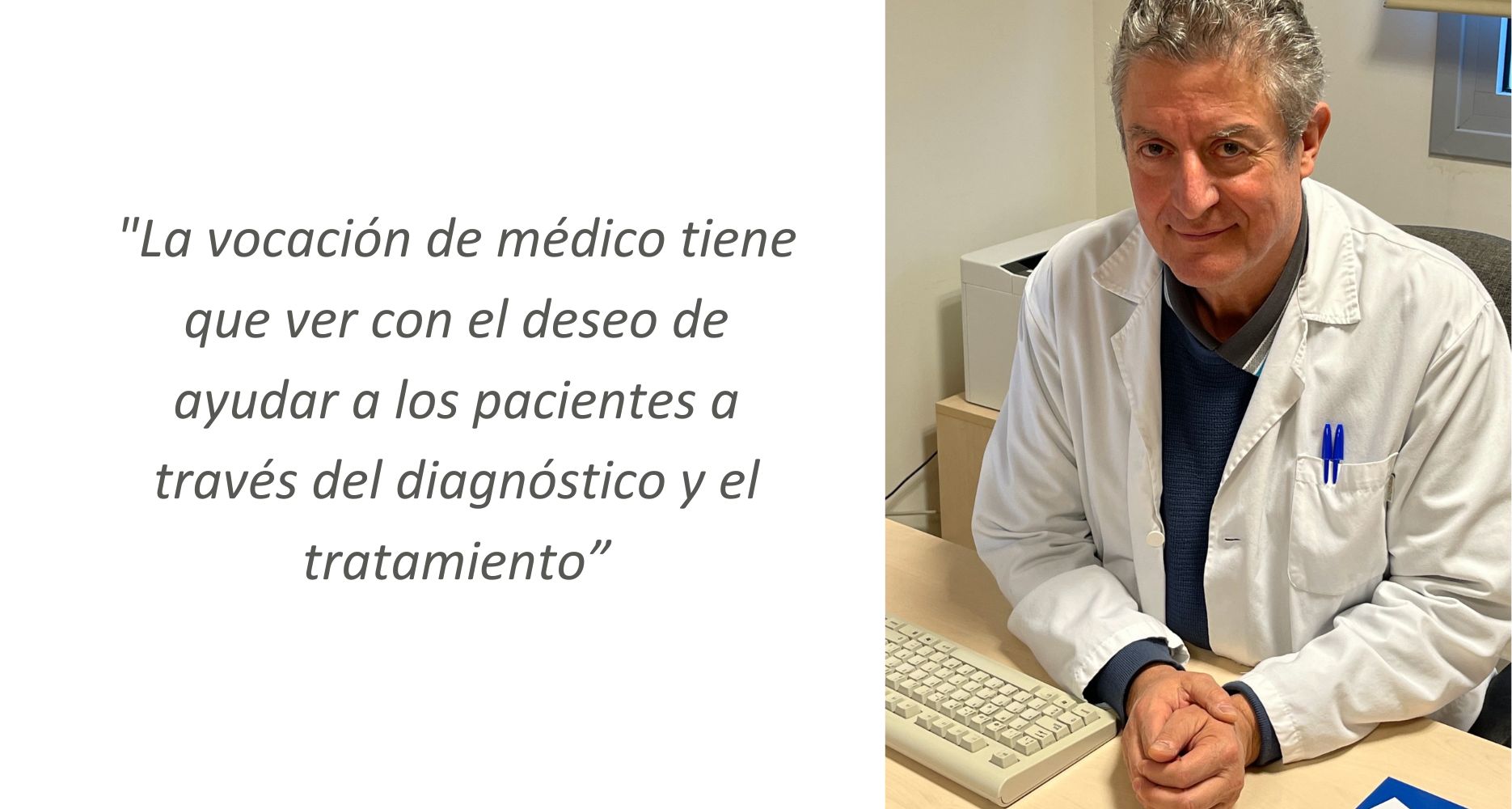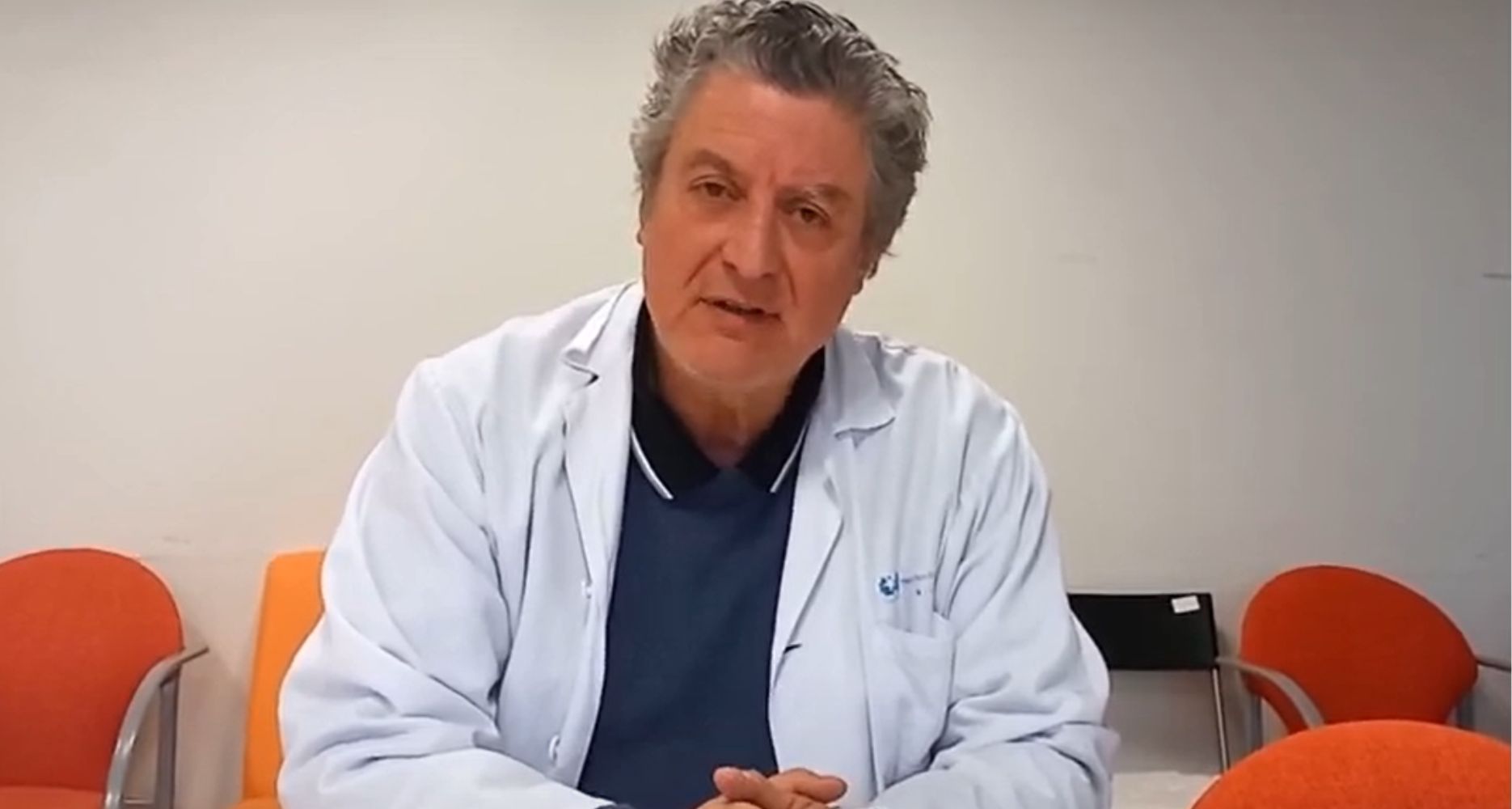
The most vocational profession: World Doctors' Day
This December 3, World Doctors' Day, AELMHU would like to pay tribute to those professionals who, with full dedication, devotion and, above all, vocation, face the most complex challenges of medicine, specifically the approach to little known or common diseases, such as rare diseases.
Among them is Dr. Gómez Cerezo, Head of the Internal Medicine Service at the Infanta Sofía University Hospital and Coordinator of the Minority Diseases Group of the Spanish Society of Internal Medicine (SEMI), one of the key figures in the field of rare diseases and a reference for medicine in Spain. His career is that of a physician committed to his patients and his work, a passionate academic and a restless researcher who has dedicated his life to improving the care and quality of life of patients with rare diseases.
With a career spanning more than three decades, Dr. Gómez Cerezo is a reference in our country in the diagnosis and treatment of rare diseases. With a PhD in Medicine from the Autonomous University of Madrid, with multiple academic and research positions behind him, he has directed more than a dozen doctoral theses and has been principal investigator in numerous projects on rare diseases, metabolism and, in particular, Fabry disease. But his contribution goes beyond academia and research: he is a physician who, day after day, faces the emotional and professional challenges of dealing with patients, especially those diagnosed with low prevalence pathologies.
Diagnosis: the main challenge
One of the biggest challenges facing Dr. Gómez Cerezo in his specialty is the early diagnosis of rare diseases, a challenge that has been historically complicated and that today tops the list of demands of clinicians and patients. "The delay in the diagnosis of rare diseases has been a problem for years. The delay between the first consultation and diagnosis is too long. It is true that it has been reduced in recent years, but it is still insufficient," assures Dr. Gómez Cerezo.
For him, advances in genetics and personalized medicine play a crucial and determining role. The use of genetic tools to identify low-prevalence diseases is revolutionizing the way doctors approach these cases. The ability to offer an accurate diagnosis not only improves the prognosis of patients, but also offers an answer to families who, for years, have been forced to live with uncertainty and have seen their quality of life reduced because they have been unable to access adequate treatment.
"The delay in diagnosing rare diseases has been a problem for years.
has been a problem for years.
Along these lines, the doctor is also happy to admit that one of the biggest advances in medicine today is the incorporation of artificial intelligence, which is positioning itself as an invaluable tool for improving both diagnosis and care. "Artificial intelligence has enormous potential in rare disease medicine. From detecting phenotypic patterns to helping make high-probability diagnoses, artificial intelligence is revolutionizing the way we treat patients," he says.
Artificial intelligence not only helps physicians diagnose rare diseases more quickly, but also optimizes case management and patient follow-up, improving their quality of life and making the healthcare system more efficient. "The future is promising," Dr. Gómez Cerezo notes optimistically. "Technology and artificial intelligence will allow us to advance in the diagnosis and treatment of these diseases, improving the quality of life of patients and facilitating the work of healthcare professionals."
Patients: the center of everything
Along the same lines, Dr. Gómez Cerezo also emphasizes the importance of treating patients with a comprehensive approach, i.e., addressing all the dimensions of their health. "Multidisciplinary and interprofessional work is key. Teams must be varied, not only physicians, but also nurses, psychologists, social workers... Everyone must be involved in the patient's treatment," he points out firmly. Care must not only be medical, but also emotional and social, which is essential for patients and their families, who often feel the psychological burden of the disease as heavy as the physical one.
Dr. Gomez Cerezo's vocation does not stem from a specific interest in rare diseases, but from a broader passion for internal medicine and for the challenge of diagnosing and treating patients. "The vocation as a physician has to do with the desire to help patients through diagnosis and treatment. At first, when I started at La Paz Hospital, I did not think about specializing in rare diseases, but little by little you realize that it is a world with unique challenges, which, although difficult, enrich you both professionally and personally. Each new case is a challenge that forces you to study, to get involved...", she reflects.
Along the way, circumstances and opportunities have shaped his career. Although his generalist approach allows him to address a wide variety of pathologies, he has found in rare diseases a field that combines his scientific curiosity with his desire to improve the lives of his patients. "Each case is unique and each diagnosis is a challenge. That's what motivates you to keep researching and learning. That and helping patients," he says.
For Dr. Gómez Cerezo, physicians must offer special attention to patients with rare diseases, something that goes beyond simple medical competence. "Patients with rare diseases need a special management system, an approach that is not only technical, but also human," he stresses. And the fact is that incorporating the work of different professionals, in addition to being "necessary in these cases" allows patients and their families to receive comprehensive care, avoiding the chaos and confusion they often experience when dealing with multiple specialists.

Moreover, social and psychological support are essential in the treatment of these diseases. "Patients not only need medical treatment, but also guidance on available social aids, psychological support and, in general, resources to face their new realities," Dr. Gómez Cerezo points out. He acknowledges that much remains to be done, especially in the area of psychological support, which becomes an urgent need in pathologies that do not have curative treatments, but only interventions to control or slow down the progression of the disease and its symptoms.
In his experience, Dr. Gómez Cerezo has also learned to deal with the emotional burden of working with rare diseases. The difficulty of many diagnoses and the impact of diagnoses that must be communicated to families, sometimes definitively, are particularly hard and defining moments. "The diagnosis of a rare disease can be devastating, so it is essential that the physician not only delivers the news, but also clearly explains the therapeutic alternatives and treatment possibilities," she says.
It is a process that requires great sensitivity and empathy and, according to Dr. Gómez Cerezo, must be accompanied by a management plan that provides hope and peace of mind. "The challenge is not only to diagnose, but also to emotionally accompany the patient and his or her family throughout the treatment and, in general, throughout the disease," he explains.
For Dr. Gómez Cerezo, the future of internal medicine, particularly in the field of rare diseases, is marked by scientific progress, but also by a profound change in the way care is organized and coordinated. "The next challenge is to achieve faster and more effective diagnoses, and to improve treatments for rare diseases. But we must not forget that organization and support for families are just as important," he concludes.
Today, on World Doctors' Day, we celebrate the dedication, effort and commitment of professionals like Dr. Gómez Cerezo, who, with their vocation and passion for medicine, continue to fight for a future in which the diagnosis and treatment of rare diseases is not a challenge, but an increasingly attainable reality.
Property of SEMI
